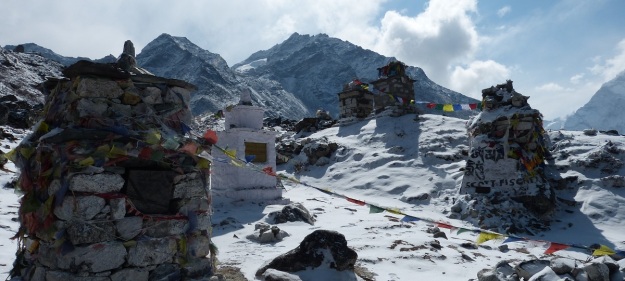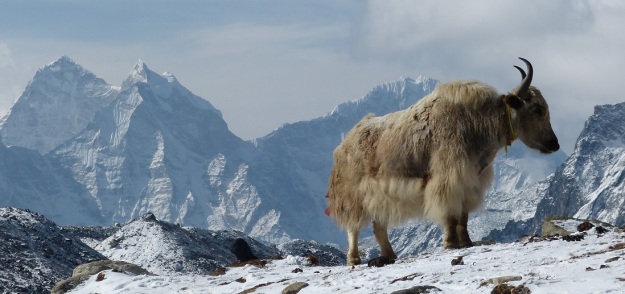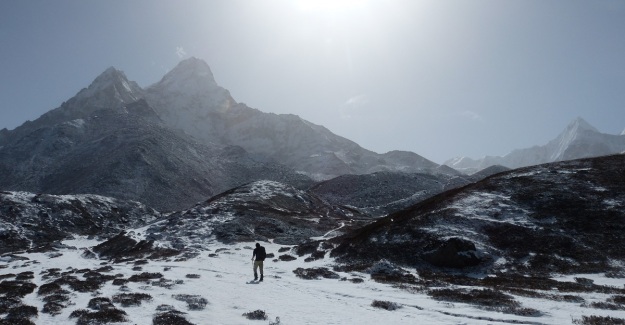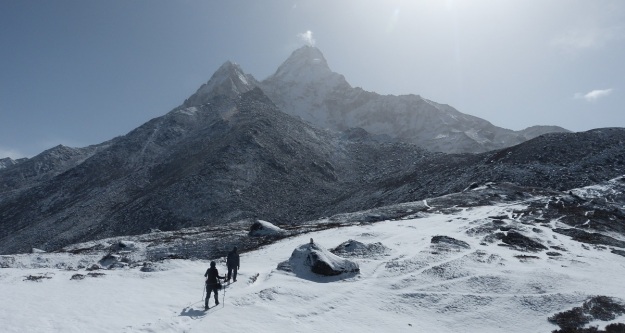
Gorak Shep (5160m) – Kala Pattar (5550m) – Lobuche (4910m) – Pangboche (3980m)
Date = 30-31 March
L&D get out of bed reluctantly. It’s minus 5°C indoors and snowing outside. Angtu has booked breakfast for 6.30am. They’ve got a 400 metre climb to the top of Kala Pattar.
They inspect the sky, which does not look promising.
D: I really want to climb the mountain.
L: I don’t seem to mind if we do or not.
D: I want to see if it clears at all. If it does I’m going up.
L: OK, if it does, I’ll come too.
There is a French boy at the next table. Despite the fact that it’s still only 7am, he says he’s already been to the top and back this morning.
D: How was it?
Boy: It was super-cold and not worth it as there was nothing to see.
D: I think it’s clearing. The sky’s lightening. It’s stopped snowing.
Boy: That’s so not fair!
L: (joking) You’ll have to do it again!
 They leave him to his breakfast and set off. There’s a thin crust of snow, a bitter wind and a leaden grey sky which is slowly shifting and cracking. Without the sun the landscape is monochrome and harsh. There is rock and snow. Black and white. Cold and colder.
They leave him to his breakfast and set off. There’s a thin crust of snow, a bitter wind and a leaden grey sky which is slowly shifting and cracking. Without the sun the landscape is monochrome and harsh. There is rock and snow. Black and white. Cold and colder.
A helicopter thuds up the valley. It lands in a snowfield below them. Three tourists get out, take photos of Mount Everest, get back in, and fly away.
The path up Kala Pattar is clear and unchallenging but steep, until the last 50m of bare rock. It seems that at 5,500 metres L has reached her temper threshold. D&L stand just below the summit and bicker. Angtu looks uncomfortable and pretends he can’t hear.
L: You go. I don’t even care about getting to the top.
D: But I want you to be with me.
L: I can’t breathe. I’m too cold.
D: Come with me.
L: I don’t want to.
D goes ahead on his own and reaches the summit. L comes slower. D is delighted. L couldn’t care less, although through her sulk she recognises that on a clear day the views would be unequalled. Just behind them, looking close enough to touch, towers the peak of Pumori. Below them lies Everest Base Camp, and the Khumbu Icefall, and beyond the glacier soars Everest – today glimpsed only fleetingly through the shifting cloud.
 D: It’s amazing! Take photos of everything!
D: It’s amazing! Take photos of everything!
L: I can’t. My hands are numb.
She hands the camera to Angtu.
D: Here – have a celebratory Snickers! We’re at 5550m! The highest we’ve ever been!
L: It’s too cold. Let’s just go. Let’s celebrate later – somewhere warm.
D: Oh. OK.
L: Have I ruined it?
D: A little bit.
L: It’s just so cold. And grey. And cold.
They start down. L’s mood and fingers thaw a fraction.
L: Sorry. I think it’s the altitude. Now we’re a bit lower, I’m less horrible already.
But she continues to feel negative all the way down. Bad vibes are streaming out of her. She’s worried the mountain will feel her antipathy and be offended and cause her to strain a knee or an ankle or fall. For an hour she mutters “thank you Kala Pattar, thank you Kala Pattar” over and over under her breath, a mantra of gratitude to drown out the rest.
On the descent they are overtaken by a youth, skipping down the mountain. It’s the French boy, who has summitted a second time that morning, and this time been rewarded with views. L is pleased for him, and continues her muttering. “Thank you Kala Pattar, thank you Kala Pattar”.
They arrive back at the warmth of the lodge in Gorak Shep and drink hot chocolate and eat pancakes. It’s taken nearly 2 hours up, and just over 1 hour down. D is glowing with a sense of achievement. L feels nothing – she’s just been for a brutally cold walk and come back again.
 They set off back to Lobuche. Without the sun to melt the dusting of snow, the landscape stays monochrome and the windchill is biting. Once again they across the chaotic maze of glacial moraine.
They set off back to Lobuche. Without the sun to melt the dusting of snow, the landscape stays monochrome and the windchill is biting. Once again they across the chaotic maze of glacial moraine.
L: What’s the most overpriced thing you’ve come across up here? Bearing in mind that everything’s justified somewhere this remote.
D: It could be the 4 dollar Kit Kat?
L: Yes.
D: Or the 400 dollar horse – for a day’s hire?
L: Also yes. One could surely buy a horse for less than that.
They join the wide, dusty, well-trodden corridor of the main trail and stride onwards and downwards.
L: I think being at altitude might be good practice for extreme old age. I imagine it’s just the same.
D: In what way?
L: Walking everywhere really slowly, with sticks.
D: OK.
L: And being always out of breath.
D: I suppose.
L: And needing to pee all the time.
D: I think that’s pregnant people, not old ones.
L: And not enough personal hygiene.
D: That’s not old people or pregnant ones. That’s just us. I’m not sure this analogy is working.
L: Oh. You could be right.
D: How long ago did we shower?
L: Does a bucket of warm water attached to a hose count?
D: Yes.
L: 10 days.
D: And wash our hair?
L: Two weeks.
D: Nice.
L: Quite.
***
It’s minus 4°C in their bedroom this morning, but outside the sky is clear.
 A team of yaks, heavily laden with equipment for Everest Base Camp, drink from Lobuche’s stream. A helicopter lands outside the lodge, throwing up a mini blizzard of fine snow which sparkles in the bright sun.
A team of yaks, heavily laden with equipment for Everest Base Camp, drink from Lobuche’s stream. A helicopter lands outside the lodge, throwing up a mini blizzard of fine snow which sparkles in the bright sun.
L is cheerful at the prospect that later today she will have a hot shower. They have splashed out a shamefully enormous sum for a night of luxury tonight and she’s looking forward to washing two weeks of dirt from her hair.
The blue sky above adds welcome colour to the rock and snow of their surroundings. As the valley widens, the horizon opens to display a succession of jagged distant peaks, and closer to, in the foreground is a similar series of turrets and pyramids, standing a couple of metres high. They are spread out across the snow-encrusted plateau, with prayer-flags flying from one to another. It’s a memorial field to climbers lost on Everest and elsewhere. Many names are Sherpa, others are from all over the world, and they include some of the biggest and most respected names in mountaineering.
 Among them is Scott Fischer, the American mountaineer and guide known for ascending the world’s highest peaks without extra oxygen. In May 1996 he led a group of clients up Everest, assisted by two other guides. After helping others, he summitted Everest late in the day and during his descent was caught in a violent blizzard that took the lives of 8 people, including Fischer. In this spot there is also a memorial to Anatoli Boukreev, a respected Russian Kazakhstani climber and one of Fischer’s fellow guides on that day. After rescuing others, Boukreev did manage to reach Fischer, but he was already dead. Boukreev survived, but was killed in an avalanche while climbing Annapurna 18 months later. One of the largest memorials is to Babu Chiri Sherpa, who climbed Everest 10 times, holding the record for the fastest ascent (under 17 hours), and for the most time on the summit without auxiliary oxygen (21 hours), as well as summitting twice in two weeks. He died on his 11th summit bid of Everest, falling into a deep crevasse in April 2001.
Among them is Scott Fischer, the American mountaineer and guide known for ascending the world’s highest peaks without extra oxygen. In May 1996 he led a group of clients up Everest, assisted by two other guides. After helping others, he summitted Everest late in the day and during his descent was caught in a violent blizzard that took the lives of 8 people, including Fischer. In this spot there is also a memorial to Anatoli Boukreev, a respected Russian Kazakhstani climber and one of Fischer’s fellow guides on that day. After rescuing others, Boukreev did manage to reach Fischer, but he was already dead. Boukreev survived, but was killed in an avalanche while climbing Annapurna 18 months later. One of the largest memorials is to Babu Chiri Sherpa, who climbed Everest 10 times, holding the record for the fastest ascent (under 17 hours), and for the most time on the summit without auxiliary oxygen (21 hours), as well as summitting twice in two weeks. He died on his 11th summit bid of Everest, falling into a deep crevasse in April 2001.
 From the memorial field, the trail descends through rock-strewn mayhem to the valley floor. The clouds build, settling on the peaks and draping everything in grey. The temperature drops. Porters toil their way up through the boulders under enormous weights bound for Base Camp. Angtu leads L carefully across an ice-bridge spanning the river, the pair of them slipping and dancing in unison, holding opposite ends of a walking pole.
From the memorial field, the trail descends through rock-strewn mayhem to the valley floor. The clouds build, settling on the peaks and draping everything in grey. The temperature drops. Porters toil their way up through the boulders under enormous weights bound for Base Camp. Angtu leads L carefully across an ice-bridge spanning the river, the pair of them slipping and dancing in unison, holding opposite ends of a walking pole.
The broad flat valley floor stretches on forever. They glimpse the tin roofs of Pheriche at the far end of the plain, but the village remains resolutely distant. They are now at around 4,300 metres.
L: Look – juniper! Actual alive growing things!
They realise that it’s been 10 days or more since they’ve seen a plant higher than a centimetre.
L: And people living their lives! Not just looking after trekkers.
They are passing tiny stone cottages, used only seasonally and empty this early in the year, and a patchwork of stone-walled yak paddocks. A stream runs through the valley and the peak of Ama Dablam soars overhead. In the sunshine it would be stunning.
In Pheriche they pause in a large lodge to rest and get warm whilst Angtu books rooms for a future group. On their way out of the village, they spot their kit bag sitting on a wall, and from the interior of a dark tin hut comes a peal of laughter and a quack-quack-quack. Phurba has found some friends.
 Over a rise they look down into the next valley, a steep-sided groove cut by a fast-flowing river. As they drop lower, the vegetation gets taller.
Over a rise they look down into the next valley, a steep-sided groove cut by a fast-flowing river. As they drop lower, the vegetation gets taller.
L: No way! Real trees!
She points. On the opposite side of the valley, the hillside is cloaked in woodland.
D: Oh – how we’ve missed them!
L: Look how lovely they are. Even though they’re not in leaf.
The tiny village of Shomare is a cluster of proper homes. There are hens and little veg plots. They stop for lunch in one of the only lodges. The dining room is beautifully draped in wall hangings and the floor is spotlessly swept. Outside the window a tiny girl toddler stands on a narrow ledge. She puts her head through the open window and roars like a lion. Then laughs. She tries to climb in through the window, gives up and disappears.  She potters through the door curtain and climbs up onto the bench next to L. They stare at each other for a bit. She puts her face right up to L’s, and laughs. She pokes L. L smiles and pokes her gently back. She giggles and pokes. And giggles and pokes. And giggles. The soup arrives. Her mother shoos her off the bench. The little girl tries to climb out of the window, gives up and disappears back through the curtain. She makes herself busy in the yard throwing cups of water at hens.
She potters through the door curtain and climbs up onto the bench next to L. They stare at each other for a bit. She puts her face right up to L’s, and laughs. She pokes L. L smiles and pokes her gently back. She giggles and pokes. And giggles and pokes. And giggles. The soup arrives. Her mother shoos her off the bench. The little girl tries to climb out of the window, gives up and disappears back through the curtain. She makes herself busy in the yard throwing cups of water at hens.
The onward path is narrow, high above the river. They’ve not got far to go, and so amble leisurely behind a train of yaks. A man scrambles up the bank from the river, hauling a sack of hay.
Man to Angtu: It’s my mule. He fell.
They peer over the edge. On a faint trail 15 metres below them stands a brown mule. He seems miraculously unharmed by his fall. Two boys try unsuccessfully to pull and push the animal back up to the trail. But the mule has had quite enough excitement for one day. He’s going nowhere.
Pangboche is big and spread out. There’s the first bit they come to, the bit round the corner, and the bit up the hill. Their luxury lodge is in the first of these. The extortionate price buys them a warm welcome with a hot towel, a cup of tea and a large slice of chocolate cake. After the last fortnight, it’s paid for itself right there. The room is surprisingly cold, despite the fact that they’ve dipped down to just below 4,000m, and the quality is of European 2-star level. But it’s easy to forget that this village is still a week’s walk from the nearest drivable track. It has comfortable beds and proper bedclothes.
 Lodge: The hot water bottles are free. Would you like some?
Lodge: The hot water bottles are free. Would you like some?
L: Fantastic – yes please.
Lodge: Great. How many?
L: Oh – umm….
Lodge: As many as you like.
L: I think three.
Their en-suite bathroom has hot running water. They launder some essentials and then lower the tone by hanging them up to dry in the corridor window. The loo is all their own. The gas powered shower is weak and fills the room with noxious fumes but the water is scaldingly hot and doesn’t run out and they both wash from top to toe, thoroughly.
L: It’s so wonderful to be clean.
D: Though our clothes still smell.
L: Who cares?
Angtu urges them not to waste yet more money on forty dollar meals in the hotel so they follow him to the lodge opposite. D is feeling queasy from the gas fumes. L orders a cheese & tomato pizza. Angtu returns from the kitchen.
Angtu: They have no tomato. You could have just cheese.
L: A cheese pizza would be great, thank you.
The pizza arrives. The kitchen have decided that just cheese won’t do. They have compensated for the lack of tomato, with alternatives.
D: What’s on your pizza? That’s not just cheese.
L: No. There’s cheese…and carrot…and cabbage.
D: Good luck with that!
He smirks and tucks into his dal bhat, though the gas has dulled his appetite. L is hungry and starts on her pizza.
D: How are you doing?
L: It’s OK. But it’s not right. It’s great to eat cabbage and carrots, and it’s great to eat pizza, but combining the two should be illegal.



 They cross the river below the village on a steel bridge strewn with prayer flags, and follow a wide path leading up to an open plateau. The sun streams from behind Ama Dablam’s peak, throwing it into silhouette and making the broad snow-field sparkle. Two other small groups, half a dozen trekkers each, are admiring the views back to Pangboche. L strides away across the plateau.
They cross the river below the village on a steel bridge strewn with prayer flags, and follow a wide path leading up to an open plateau. The sun streams from behind Ama Dablam’s peak, throwing it into silhouette and making the broad snow-field sparkle. Two other small groups, half a dozen trekkers each, are admiring the views back to Pangboche. L strides away across the plateau.
 They walk towards the little cluster of expedition tents. A dozen or more people are standing or sitting in a group.
They walk towards the little cluster of expedition tents. A dozen or more people are standing or sitting in a group. L: I do actually. I’d really like to think so. The thing is, this landscape is just so enormous, and the weather and conditions up here are so powerful, that it makes one – well, me anyway – feel very tiny and at the mercy of my surroundings. And if you can’t control your environment, it’s instinctive to want to do all you can to stay on its good side.
L: I do actually. I’d really like to think so. The thing is, this landscape is just so enormous, and the weather and conditions up here are so powerful, that it makes one – well, me anyway – feel very tiny and at the mercy of my surroundings. And if you can’t control your environment, it’s instinctive to want to do all you can to stay on its good side. The way up to the 16thC Pangboche Monastery is lined with mani walls. Lots of them. D&L carefully pass them all to the left. Terraced fields are dotted with neat piles of manure and women are preparing the ground for planting potatoes. Pangboche is the oldest Sherpa village in the region, and this is its oldest monastery.
The way up to the 16thC Pangboche Monastery is lined with mani walls. Lots of them. D&L carefully pass them all to the left. Terraced fields are dotted with neat piles of manure and women are preparing the ground for planting potatoes. Pangboche is the oldest Sherpa village in the region, and this is its oldest monastery.
